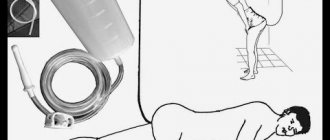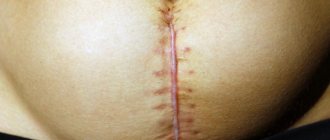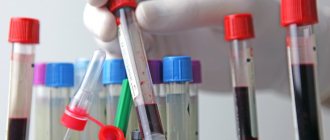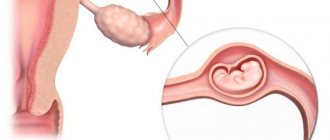According to statistics, approximately 25% of children in Russia are born through caesarean section. In our perinatal center, this figure is approximately twice as high, since we specialize in the diagnosis and management of women in labor with pregnancy pathologies. Therefore, every day I have to answer “ Caesarean ” mothers (that’s what we call our little patients who were born through CS) to many questions related to the healing of sutures, lactation, and discharge. In particular, the topic of menstruation after cesarean section is often touched upon.
My patients' concerns are completely justified. After all, menstruation is an indicator of a woman’s health. If your period comes on time and proceeds without complications, we can say that the caesarean section went well, without consequences, and the mother’s body is recovering as planned. But not everyone knows when this “on time” should come, and in what cases the alarm should be sounded.
In this article, I will tell you in detail when the first period should arrive after a cesarean section, how heavy it can be, and how lactation or its absence affects menstruation. Let us also consider the reasons why regulations may be missing and other important points.
When does menstruation start after cesarean section?
To understand how long a woman in labor should normally undergo regulation, it is worth considering the situation comprehensively. So, every month serious transformations occur in the female body, which contribute to possible fertilization. Almost all systems undergo metamorphosis, especially:
- sexual;
- cardiovascular;
- nervous;
- endocrine.
All these changes mark the arrival of the next regulations. If pregnancy occurs in a certain cycle, the expectant mother’s body will switch to a different mode aimed at ensuring the development and safety of the fetus. After the baby is born, the process of involution begins, i.e., the return of all systems to their usual “pre-pregnancy” state. When the functions of all systems are restored, menstruation comes - after a cesarean section or after a natural birth - it does not matter.
It is worth clarifying that the regula is necessarily preceded by postpartum discharge, called lochia. They can last quite a long time - up to 2 months and constantly change intensity, smell and color. And only after the specified period of time, menstruation begins after a cesarean section. It is not uncommon for the first postpartum cycle to be anovulatory, that is, it occurs without ovulation. This means that the young mother cannot yet become pregnant again. By the second cycle the situation usually stabilizes. For a woman, this is a signal, first of all, that it is time to think about contraceptives. But we'll talk about this another time. And now I want to clarify that the question of when menstruation normally begins after a cesarean section is very individual. Firstly, the concept of normal is different for each organism.
Secondly, surgical childbirth does not in any way affect the timing of the onset of menstruation - everything happens exactly as during natural childbirth and depends on many factors, including:
- Age of the woman in labor.
- Features of the course of pregnancy.
- The quality of a woman’s rest and nutrition, her lifestyle.
- The psycho-emotional state of the expectant mother, the presence of chronic diseases.
- Physiology.
- Presence/absence of lactation.
It also matters what kind of birth a woman has. In my practice, there have been cases when first-time mothers’ menstruation came almost immediately, but after the second child, it took several months.
What are menstrual flow after cesarean section?
This takes on special meaning in connection with the past operation. The nature of menstruation may indicate the presence of disorders caused by it, or poor healing of sutures, as well as infections.
Normal discharge
The first menstruation after cesarean is quite intense. Women notice this in themselves in the first two months. During this period, this is absolutely normal if the process does not significantly worsen her well-being. The large amount of menstrual flow is explained by the work of hormones and the characteristics of the body of a particular woman. If this continues longer than the specified time, consultation with a gynecologist is necessary. It is possible that heavy periods signal hyperplasia or some other disease. In the first month, critical days can occur without the egg maturing, since the body has not yet recovered sufficiently. By the next menstruation, the ovaries will be working at full capacity, the hormonal balance will also be closer to normal, so you should wait for ovulation.
The menstrual cycle after cesarean section may be inconsistent for 3-4 months. Then it returns to the parameters before pregnancy or acquires others. But the period of time from one menstruation to the next should still not be less than 21 or more than 35 days. Its duration should normally be no longer than 7 and no shorter than 3 days. That is, the previous features of the entire process, both temporary and quantitative, are preserved without any discounts on the surgery performed. Everything beyond their limits is subject to examination by a specialist and treatment.
What should not happen after cesarean
There are several signs of menstruation after cesarean section, because of which a woman should be concerned and contact a specialist:
- Sudden cessation of lochia before the usual time. Almost always, this means a bend of the uterus, in which the secretions are not discharged out. This provokes endometritis;
- Scanty periods. This may be evidence of insufficient contraction of the uterus, stagnation of secretions occurs in it, which is fraught with inflammation or may be a symptom of an already acquired disease;
- “Jumping” cycle six months after surgery. This is also a signal of trouble. Normally, most women notice that the birth of a child has relieved them of irregularity and reduced the pain of menstruation, as well as the manifestations of PMS;
- Heavy periods after cesarean section, noticed longer than 2 cycles. This is more like uterine bleeding and requires treatment. After surgery, a suture remains on the organ, which prevents it from contracting as needed. If a woman needs more than one pad per hour, emergency care is needed. The duration of critical days is also of particular concern if it is more than 7;
- Strong foul odor of menstrual fluid. This happens with infections or a purulent process occurring in the genitals. Endometritis manifests itself in a similar way, supplemented by fever and abdominal pain. After a cesarean section, the latter disease occurs more often than during natural childbirth;
- Long-term daubing before critical days and after their completion. Normally, nothing like this should happen;
- A curd-like discharge accompanied by itching. Due to the use of antibiotics after cesarean section, a woman may develop thrush, which is especially dangerous in the postpartum period;
- Frequent periods occurring longer than 3 cycles. At first, menstruation, which occurs, for example, once every 14-20 days, does not pose any danger. But in the future, this may indicate a violation of the contractility of the uterus caused by surgery or the negative influence of medications.
Reasons for missing periods
Most often, for patients who do not begin menstruation for a long time after a CS, after conducting a series of tests, I diagnose “lactation amenorrhea.” The reason lies in prolactin, which, by stimulating milk production, postpones ovulation for a certain period of time, thus protecting the young mother from possible conception, which carries a high risk if she has recently undergone surgery. The issue of the dependence of regula on breastfeeding requires detailed consideration, so we will return to it a little later. Now let's talk about other factors that can influence this process.
When your period comes at least once after a cesarean section, and then disappears again, this may be caused by the onset of a new pregnancy. With an unregulated cycle, the risk of re-conception is very high. Therefore, in such situations, women need to be extremely careful, especially if the delay is accompanied by symptoms of toxicosis.
How long have you been waiting for your period?
2 monthsfrom 3-4 months
Another reason why menstruation may be absent is inflammation of the appendages, which causes hormonal imbalance in the body. You should also not exclude tumors of the ovaries, uterus, etc. Such complications are quite rare, but still occur periodically in my practice.
Endometriosis can also cause disruptions in the menstrual cycle. After surgery on the uterus or as a result of natural childbirth, during which there were ruptures and injuries of the birth canal, this disease appears especially often.
In any of the above cases, you should consult your doctor. As a rule, after an examination it turns out that the reason for the lack of regulation is nothing more than the characteristics of the female body, and everything gradually returns to normal. But still, the situation must be monitored in every possible way to avoid serious pathologies.
Normal menstruation after cesarean section
Women begin to worry about their discharge immediately after pregnancy, unless there is postpartum depression. And women are right - discharge has a special meaning in connection with surgical interventions in women’s health.
Internal processes that occur painlessly are primarily indicated by menstrual flow. They can also warn about possible problems caused by the operation - infections or improper healing of sutures.
The first critical days after surgical birth are characterized by severe intense bleeding. This situation should “torment” women for only two months, although the woman’s well-being does not deteriorate significantly.
The fact is that hormones begin to work hard to restore a woman’s ability to bear children. However, if heavy periods do not stop for a long time, you should consult a gynecologist. Most likely, such menstrual discharge is an indicator of hyperplasia, excessive cell formation, or other serious diseases.
In the first month after the critical days, ovulation does not occur - the body has not yet recovered sufficiently. But by the next menstruation, the ovaries will begin to work at full capacity again, hormones will finally be balanced and ovulation will occur regularly.
Considering the individual characteristics of a woman’s body, there is no need to worry about the variability of the cycle in the first 3-4 months. Afterwards, the menstrual cycle normalizes and the interval between menstruation averages from 21 to 35 days, but the duration of menstruation can go beyond 3-7 days. That is, after 3-4 months there is no need to make any discounts on the operation - the process of critical days should proceed as usual. If this does not happen, you should be seriously concerned.
Menstruation after cesarean section while breastfeeding
So, let's return to the issue of the relationship between menstruation and lactation. As I always explain to my patients, the female body is entirely dependent on hormones. If we consider such an issue as menstruation after cesarean surgery while breastfeeding, then prolactin rules the roost. The pituitary gland is responsible for its production. In addition, the process involves: the placenta, the immune and nervous systems, and even the mammary glands.
Prolactin affects the body systemically. In particular, it “forces” the mammary glands to grow and produce milk. As a result, less progesterone is produced in the corpus luteum of the ovaries. Ovulation does not occur, and, accordingly, the phases of the menstrual cycle do not change. That is, a woman is infertile during this period.
If we talk specifically about the timing of the arrival of menstruation after a CS, when breastfeeding is present, we can highlight the following:
- In a young mother who actively breastfeeds her baby, regulation may not appear for a long time, up to a year.
- When breastfeeding after cesarean section, menstruation in most cases occurs when the first complementary foods are introduced.
- If the newborn’s diet is mixed, menstruation may make itself felt 3–4 months after delivery.
This is interesting! The more often breastfeeding occurs, the more prolactin is produced. Thus, frequent application of the baby to the breast stimulates the flow of milk.
It's no secret that young mothers are very suspicious and vulnerable to various “information attacks.” And there are plenty of advisers - from experienced grandmothers to the “gurus” of obstetrics and gynecology who fill thematic forums. Thanks to such, not always useful, recommendations, the topic of menstruation after childbirth has become overgrown with a huge number of myths, most of which concern the compatibility of menstruation and feeding. I have prepared rebuttals for the most common ones:
- Myth No. 1: With the arrival of menstruation, milk begins to taste bitter, and the baby may refuse it.
In fact, the taste of milk is in no way determined by the presence or absence of regula. It has its own unique and stable taste, which, moreover, does not particularly depend on the diet of a nursing mother. Undoubtedly, there may be slight changes in the taste of milk. But, firstly, this is not related to menstruation, and secondly, the child cannot react to them in any way.
- Myth No. 2: The onset of menstruation is a signal that it is time to stop breastfeeding.
During the restoration of the cycle, a woman can, or rather, even needs to continue to breastfeed her baby. It is rare, but it happens that in the first few days lactation may decrease, but there is no need to worry - it will recover just as quickly. During the KD period, women often become unreasonably irritable and restless. The baby certainly “reads” these emotions and also begins to be capricious. However, as soon as mommy calms down, the baby also “duplicates” her mood.
- Myth No. 3: During menstruation, the baby will not want to take the breast.
As my experience shows, problems with breastfeeding arise for completely different reasons. For example, when inexperienced parents or caring grandmothers “treat” a newborn with a pacifier, water or formula from a bottle. All these attributes disorient the child, he begins to turn away from the breast. And when this coincides with a certain period of the cycle, mothers immediately find a negative relationship between breastfeeding and menstruation. In reality, both of these processes are natural and coexist quite peacefully in the female body.
Undoubtedly, lactation and regulation depend on each other. As soon as breastfeeding is disrupted, prolactin production decreases. The eggs begin to mature, which leads to ovulation and, as a consequence, the possible arrival of menstruation.
The nature of the first menstruation after cesarean section
This article talks about typical ways to solve your issues, but each case is unique! If you want to find out from me how to solve your particular problem, ask your question. It's fast and free
!
When your first period comes after a caesarean section, your periods may be very heavy. At this time, it is especially important to avoid any stress, not to be nervous, take time to sleep and rest, and eat normally. Lifting heavy objects is especially dangerous, as it can lead to increased bleeding. Heavy periods after cesarean section should stop after 1-2 cycles.
It is advisable to visit a gynecologist in the first 3-4 months after the baby is born. Signs of deterioration:
- temperature;
- soreness;
- heavy and prolonged bleeding;
- absence of regular periods 3–4 months after childbirth;
- the appearance of blood in the middle of the cycle.
A woman needs to be examined if her discharge is unusually scanty after surgery. The resulting scar on the uterus can interfere with the contraction process and prevent its cavity from being completely cleared of blood. In the pelvic area, stagnant processes develop that can cause inflammation. Very strong discharge may indicate uterine bleeding.
Menstruation after cesarean with artificial feeding
When a baby is fed artificial formula, since the mother, for whatever reason, cannot breastfeed him, the level of prolactin in the mother’s body decreases almost at lightning speed. Literally a few weeks are enough for eggs to begin to be produced. In such cases, menstruation after childbirth comes very quickly - as soon as the lochia runs out. They, in turn, are completed as soon as the uterine mucosa goes through all stages of involution, that is, it is completely restored. Normally, this process takes 1–2 months. And now those discharges that appear after lochia are menstruation.
In a woman who does not breastfeed, the restoration of menstruation, or rather the cycle, occurs faster - in approximately three months. During this period, the woman in labor needs to very carefully monitor the timeliness of the regulations.
If menstruation after a cesarean section during artificial feeding is systematically too heavy or, conversely, irregular, you must inform your doctor about this. The specialist, after conducting an examination, will either confirm that there is no cause for concern or prescribe treatment. Only timely therapy will allow you to avoid serious complications.
When to expect regular menstruation
If you are especially interested in when your period comes after a cesarean section, then the answer to this question should begin with whether you plan to breastfeed your baby.
The fact is that prolactin (a specific hormone of the female body) is responsible for the lactation process, which, when released, blocks the activity of the ovaries, therefore, reproductive function cannot be quickly restored. While the mother actively feeds the baby with breast milk in the first months after the birth of the baby, all prolactin is spent on milk secretion. After a woman begins to feed the baby with various formulas, the negative effect of prolactin on the release of an egg decreases, as a result of which the possibility of a new conception gradually returns. In this case, within three to four months, normal, regular periods will begin.
https://youtu.be/Ym5LiGNLkbQ
If the baby is bottle-fed from birth, the mother’s menstrual cycle will resume as it should be on schedule - after a month or two, maximum three. But this is counted from the moment the lochia stops secreting. If complications, inflammation, pathologies, or adhesions develop, menstruation may not begin for a little longer, which is not always a reason to panic.
If a non-breastfeeding mother’s menstruation has not occurred after six months, you should definitely visit a gynecologist.
In addition to the fact that breastfeeding mainly influences the onset of menstruation, doctors also identify several other factors that should not be forgotten. These include:
- Lifestyle;
- chronic diseases;
- psychological state of the woman (nerves, increased excitement, anxiety);
- complete rest;
- food quality;
- individual physiological characteristics.
Each of the listed factors in itself may not affect the resumption of menstruation and the restoration of the cycle, but the greater their totality, the more significantly this affects the body’s recovery process.
Considering all that has been said, we can say with confidence that it is impossible to predict exactly how long it will take for menstruation to begin; you should be prepared for this at any time.
How long does your period last after cesarean section?
If we talk about discharge in general, the first ones last long and profusely. But they are only distantly related to menstruation, despite the fact that they are very similar in color. We are talking about lochia, which is also bloody in nature, which is why many people mistake it for menstruation. As I said above, their duration can be a month or more, which often causes anxiety among young mothers.
I sometimes hear from my patients: “Doctor, why is my discharge taking so long? Well, my roommate’s roommate has already finished everything a long time ago.” Unfortunately, such “neighbors” have no reason to rejoice. How long your period lasts, or more precisely, lochia after a cesarean section, directly indicates the state of health of the woman in labor. If the discharge passes quickly, or even worse, does not begin at all, this indicates an accumulation of wound contents inside the uterus. The risk of developing an intrauterine infection in such situations is incredibly high, and urgent therapy is necessary with the use of drugs that will “force” the uterine muscles to contract intensively.
Speaking about when menstruation should start and how long it lasts after a cesarean section, I note that there is no single norm. The “start” depends on the speed of recovery of the body, and as for the number of days, their duration does not depend on the method of delivery. Many factors come into play here. First of all, the genetic component, as well as how long the regulation was before pregnancy. As a rule, the cycle after childbirth is the same as before it, or increases/shortens by two to three days.
How does recovery occur after such an operation?
A caesarean section is performed under general anesthesia, with an incision into the abdominal wall and the anterior surface of the uterus. Subsequently, the body spends resources on tissue healing, which inevitably affects the woman’s well-being and can delay the first menstruation to a later time.
However, the rest of the body develops the same processes as after normal childbirth. We are talking about returning to normal hormonal levels, the previous size of the uterus, and the functioning of the ovaries. It is worth remembering that a woman, as a rule, is breastfeeding for several months, and sometimes a year. This also affects how and when to expect your period after a C-section.
Changes in the body begin immediately. The uterus contracts and becomes smaller. The wound existing on its surface heals and bleeds. Normal healing is indicated by reddish discharge - lochia. They last the first 6-8 weeks after the birth of the newborn, and during this time their character changes. At first it is a red discharge with clots and a specific odor; their quantity can reach 500 ml per day. Later they become darker from coagulated blood and come out in smaller volumes. At the end, the secretions lighten, becoming similar to those produced by the uterus before pregnancy. Tissue damage during a cesarean section may briefly prolong the process of lochia removal. To make recovery go faster, a woman needs to follow some rules:
- Empty your bladder on time. It should never be overfilled, as this provokes bleeding and prevents the healing of the suture, the organ puts pressure on the uterus;
- Take care of your own hygiene. This means regular thorough washing, using unscented pads and changing them frequently;
- Put the newborn to the breast more often to stimulate contractions of the smooth muscles of the uterus.
But lochia is not menstruation yet, but only preparation for the previous mode of existence. Their cessation means that the parameters of the female body are approaching the state before pregnancy.
Interesting: Birth Control Pills That Can Help You Lose Weight
Heavy periods
There may be several reasons for this. But first of all, you need to make sure that it is heavy periods, and not lochia after a cesarean section. To exclude uterine bleeding, you need to correctly assess the volume of fluid released.
A cause for concern is the need to replace hygiene products more often than every 2-3 hours. Try to estimate approximately how much blood is lost. Normally, no more than 50 grams should be consumed throughout the entire menstruation. If this figure is about 80 grams, we can say that the first menstruation is heavy. Blood loss of more than 80 grams is considered pathological and requires medical intervention.
When the first menstruation, which began after a cesarean section, is very heavy and with clots, that is, with pieces of the endometrium, an appointment with a gynecologist is mandatory. This can be caused by both hormonal changes in the body and the use of contraceptives. In addition, the intensity of menstruation may change with age or due to childbirth. In this case, there is no reason to worry.
But there are other explanations why periods after a cesarean section are painful and heavy. We are talking about endometrial hyperplasia - uneven and excessive growth of the uterine mucosa. This happens when the female body produces large quantities of estrogen and at the same time experiences a deficiency of progesterone. To eliminate pathology, I usually refer patients for uterine curettage. Curettage allows you to solve two problems at once - stop bleeding and exclude oncological processes, since the endometrium after the procedure is immediately sent for histology.
In any case, if you experience any symptoms that may indicate bleeding, seeing a doctor is the best option. Self-medication in such situations is inappropriate and dangerous. After all, the cause of large blood loss can also be an ectopic pregnancy, one of the consequences of which is infertility.
When does the cycle return?
The restoration of a stable menstrual cycle after childbirth occurs 2 months (but not longer than six months) after the onset of menstruation. If there is no breastfeeding, but menstruation does not begin, the woman needs to consult a specialist. The second warning sign is abnormal amount and duration of bleeding. At the beginning, the discharge may be abundant, but later its intensity decreases.
After a cesarean section, the normalization of the cycle occurs more slowly, since this is hampered by the scar on the uterus. Normal healing of the suture has a positive effect on other manifestations of the reproductive function of the body. For a quick recovery, you must follow your doctor’s recommendations and treat your own body with care. When you have heavy periods after a cesarean section, it is important not to miss dangerous uterine bleeding.
When breastfeeding
During natural feeding, the hormonal balance of a woman who has given birth shifts, ensuring the production of milk by the mammary glands. The hormone responsible for this process inhibits the restoration of the menstrual cycle. When a woman has undergone surgery, the period for the return of menstruation will depend not on this fact, but on the presence and intensity of natural feeding.
The more often and intensively breastfeeding, the better the body produces the hormone prolactin and the further the onset of menstruation is delayed. You cannot rely on the fact that this excludes the possibility of pregnancy. Regardless of the presence of milk in the breast, within a year the reproductive capacity of the body will be restored. When this happens can be determined by the start of feeding the baby with other foods. As soon as the intensity of breastfeeding decreases, ovarian function resumes.
With artificial feeding
Many women who give birth through surgery have problems producing breast milk. This may be affected by difficulties in recovering the body after surgery, nervous excitement, or the need to temporarily separate her from her child during the mother’s treatment in the hospital. If milk is not produced, the ability to conceive is restored faster.
When artificially feeding a baby, the ability to fertilize can return to the mother after the first menstruation, and a regular cycle (from 3 to 7 days) will be restored within two months after birth. It is important to remember that conception during this period is not only possible, but also extremely dangerous for a woman, since the suture on her uterus has not yet completely healed.
Possible deviations
A woman in labor needs to carefully monitor her cycle, as well as the duration, intensity and quality of menstruation. It is best to mark the day of the first regula on the calendar, and if there is no delay in menstruation, it means that the cycle is restored normally.
Let's look at the symptoms that should alert you, as they may indicate possible deviations:
- Excessive discharge, which causes abdominal pain after cesarean section. This may indicate the presence of placental polyps or uterine damage.
- Unusually scanty periods. As a rule, this indicates an exacerbation of chronic processes in the body. If the amount of blood loss does not differ significantly from what it was before pregnancy, then perhaps the reason is the formation of the cycle.
- There are no periods for a long time after a cesarean section, and the delay is replaced by sudden and severe bleeding. This phenomenon is a clear sign of fibroids or endometriosis. In addition, such a problem may indicate serious hormonal imbalances in the body, failure of ovarian function. As a rule, identical deviations are observed in patients with complicated pregnancies, when edema, increased blood pressure, convulsions, etc. occurred before birth.
- Prolonged regulation with clots. Clots often indicate existing diseases of the reproductive system.
- Menstruation does not begin at all, although lactation is absent. The reasons for this may be different - an examination of the uterus, ovaries, and also a check of hormone levels is required.
The first regulations after a CS are a “mirror” of the rehabilitation period. Therefore, it is very important to monitor its regularity and quality characteristics. Any changes should be considered carefully. After all, whether a woman will be able to become pregnant and give birth in the future depends on how quickly and correctly the cycle is restored.
Caesarean section or normal childbirth – what do you choose?
According to the medical programs of our country, expectant mothers have no choice. Caesarean section is considered a more modern and faster model of delivery, but is still a surgical operation. To carry it out, it is necessary to have indications prohibiting the expectant mother from having a natural birth.
Conditions that prevent the natural birth of a child:
- Emergency surgery for umbilical cord prolapse, placental abruption;
- Previous surgical operations on the uterus. Thus, a scar on the uterus is an indication for cesarean section;
- Breech presentation of the baby, to prevent injury to the child;
- Disturbances in the functioning of the cardiovascular system;
- Eye diseases;
- The physiological parameter is a narrow pelvis.
The conditions described above oblige the gynecologist observing you to perform a caesarean section to preserve the health of not only the baby, but also the mother.
Undoubtedly, such an operation is carried out every day, and even hourly, but no one has canceled the possible occurrence of undesirable consequences. Therefore, no one can give a definite answer to the question “when does menstruation begin after cesarean section”.
Doctors' opinion
Obstetrician-gynecologist of the first category Artur Medyanikov advises: “First of all, I would like to once again draw the attention of women to the fact that after childbirth by Caesarean, menstruation returns within the same time frame as after a natural birth. If a young mother is breastfeeding, then you should not wait for menstruation earlier than six months later. When a baby grows up on artificial formulas, in most cases, the critical days for women in labor begin within a couple of months. But definitely everything depends on the individual characteristics of the body. There are many factors that influence the speed of the onset of menstruation.
The most important of them is age. Thus, the body of a young woman requires less time to fully recover than an old woman. We cannot discount genetic predisposition, lifestyle, etc. For example, due to malnutrition, smoking, alcohol abuse, chronic fatigue and stress, the first regulations can begin very early - even a month after a cesarean section.
The most important thing is that every woman after childbirth should take care of herself, especially with regard to menstruation, since menstruation is an indicator of the reproductive health of a young mother. Be sure to pay attention to the abundance of discharge - large volumes of blood should be released only on the first day. Then the regulation normally declines. The presence of pain should also alert you - the stomach hurts “these days” in most cases only in the presence of inflammation and diseases of the reproductive system. It is important to note the smell of the discharge - it should not be there. If a woman follows all the rules of hygiene, but the regula still smells unpleasant, she needs to consult her doctor.
Postpartum periods should not differ from “pre-pregnancy” ones in color. The presence of mucus and small clots is normal. But bright scarlet or, conversely, dark red blood should alert you.”
When to be wary
So, the first period can come in 2 months, or it can be delayed for six months or longer, and this will also be a variant of the norm. But sometimes their delay or absence is a reason to consult a gynecologist. This must be done in the following cases:
- there is no breastfeeding, but within 3 months after cesarean, menstruation did not begin;
- menstruation has resumed, but lasts less than 3 or more than 6 days;
- discharge is scanty or too abundant;
- menstruation constantly begins or ends with spotting;
- if six months after the first menstruation the cycle has not become regular.
If you have undergone a cesarean section, remember that this is quite a lot of stress for the body. Recovery can be accelerated if you eat a varied and healthy diet, get enough sleep, maintain moderate physical activity, and avoid anxiety. All this will promote lactation and the resumption of all body functions. Carefully monitor your health and follow all the gynecologist’s instructions.
The child is born and the mother begins the process of restoring all rhythms, first of all, regular menstruation. At the same time, the ability to conceive returns. It is especially important to remember this for those women who had to undergo a cesarean section, since after the operation, complete restoration of the uterus is possible no earlier than three years later.











